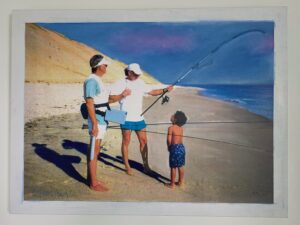Imagine what went through the head of a cub reporter at the Provincetown Advocate in 1978 when he was informed that Paul Brodeur, the prolific novelist, environmental journalist, and New Yorker staff writer, was on the line.

A few years after the Watergate scandal, Washington Post reporters Bob Woodward and Carl Bernstein were the reigning stars of journalism. But to our small newspaper staff, no star was brighter than Paul Brodeur’s. He was, after all, the man who had almost singlehandedly brought down the evil asbestos empire and had focused the world’s attention on the rapidly expanding hole in the Earth’s ozone layer. Now he was on the warpath again, exposing what he argued were the unseen dangers of microwaves.
Along with many other chores at the Advocate, I was writing a weekly fishing column. I would have been heartbroken if he had called only to get the scoop on the upcoming weekend’s fishing. He began our first conversation with kind remarks about my writing and reporting.
Paul, who died on Aug. 2, began calling every Thursday on his way to Truro, where, with money from the sale of movie rights to his novel The Stunt Man, he was building a poured-cement home designed by the brilliant Charlie Zehnder. By summer, we were fishing together nearly every day he was on the Cape, catching stripers and bluefish and talking about Cape Cod’s environmental conflicts, such as the battle with Wellfleet’s selectmen over control of the Herring River’s water level.
At the top of his list of concerns were microwaves from the huge PAVE PAWS radar station at the Air Force base in Sandwich, which he was convinced put many Cape Codders at risk. Paul became my go-to source on that and many other issues. I remember spending an entire day perched atop his unfinished house, radiation counter in hand, gathering readings from the radar stations in Sandwich and North Truro.
Paul’s precise, detailed reporting on the complex science behind his environmental articles was, curiously, paired with a stubborn old-school streak. He eschewed modern writing conveniences. “I think better with a pencil in my hand,” he would say when asked why he wasn’t using an electric typewriter or, later, a computer.
He embraced computers in the 1990s but — oddly, for a man who understood complex chemical, epidemiological, and environmental science — struggled mightily in the digital world. In fishing, he clung stubbornly to the open-faced casting reels of his youth, which he insisted were, if not better, at least more manly than modern spinning reels. Fellow fishing pal George Shafnacker of Wellfleet and I would tease him every time his reel tangled with frequent backlashes in the middle of a blitz. Eventually, he traded in his bait-casters for more artful flyrods, and yet he saw no ideological conflict in asking us to cast beyond his reach to bring fish closer to his flies.
Paul’s life was profoundly shaped by his father, Paul Sr., of whom he spoke reverently and who was likely the source of his obsessions. His father had a strict sporting rulebook that included spurning any form of hunting except by bow and arrow. His father’s French-Canadian roots also produced Paul’s unyielding belief in the supremacy of the Montreal Canadiens.
Paul embraced the ethos of the self-sufficient Cape Codder. He delighted in eating fresh-caught striper, bluefish, flounder, mackerel, and every manner of shellfish. He made his own gravlax, grew his own tomatoes, raspberries, peas, beans, and lettuce, all of which he proudly shared with friends and family. Feasts at his table were a joy for both palette and mind, and no subject was too sharp-edged or controversial. Debate and gravlax were the staple hors’ d’oeuvres.
Paul was as complex and complicated as his writing. Equally accomplished in painstakingly researched journalism and fiction, he lived a passionate life full of energy and irony. He was a loner at heart who loved human company. He adored women but never formed lasting traditional relationships, though he remained close friends with many of his paramours. He loved his children and grandchildren unconditionally and yet struggled in his sibling relationships.
He was a cauldron of contradictions. But he was also an impassioned, larger-than-life soul who cared deeply about our world and whose fame was built on talent and an innate, unique humanity reflected in his always-compelling writing.



